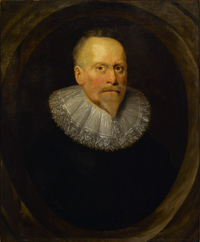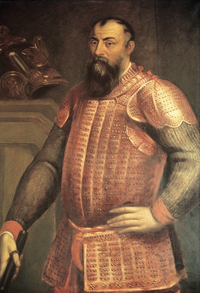Henry Bagenal
Henry Bagenal | |
|---|---|
| Born | c. 1556 England |
| Died | 14 August 1598 (aged 41-42) County Armagh, Ireland |
| Spouse(s) | Eleanor Savage |
Sir Henry Bagenal PC (c. 1556[1] – 14 August 1598[2]) was marshal of the Royal Irish Army during the reign of Queen Elizabeth I.
Life
[edit]Henry Bagenal was born in England, the eldest son of Staffordshire soldier Nicholas Bagenal and his Welsh wife Eleanor Griffith, daughter of Sir Edward Griffith of Penrhyn.[1] His brother was Dudley Bagenal.[3] Henry Bagenal probably matriculated from Jesus College, Oxford when he was 16 (in 1572 or 1573), but left without taking a degree in order to join his father Sir Nicholas who was then marshal of the army in Ireland. In May 1577, Sir Nicholas was appointed chief commissioner of Ulster, with Henry as his assistant. Bagenal was himself knighted in 1578. He was involved in some military disasters, such as a defeat at Glenmalure on 25 August 1580 when Lord Grey led the troops (with Bagenal one of the commanders of the rear) into battle with Fiach McHugh O'Byrne and Viscount Baltinglass in the Wicklow mountain passes. In 1584, Bagenal was colonel of the garrison at Carrickfergus when 1,300 of Sorley Boy MacDonnell's Scots landed on Rathlin Island. Bagenal attacked but was ambushed at Glenarm and had to retreat.[4]
In May 1586, Bagenal was sent by his father to the court to report. He sought measures to weaken Hugh O'Neill, Earl of Tyrone, an enhancement of the role of the marshal, and a presidency in Ulster with a shire hall and jail to dispense royal justice. Whilst on his visit, he wrote to Edward Manners, 3rd Earl of Rutland (a relative of his wife) on 16 September 1586 to ask whether he had a parliamentary borough to spare; he was elected MP for both Grantham and Anglesey and chose the latter. He returned to Ireland in September 1587 to deputize for his father. He succeeded his father as marshal of the army in Ireland and chief commissioner for Ulster in October 1590, and was sworn of the Privy Council. His proposals for action were not accepted, as a decision had been taken to adopt a conciliatory attempt to O'Neill. To Bagenal's contempt, O'Neill asked for the hand of Bagenal's sister Mabel in marriage; he refused, but they eloped anyway.[4]
In May 1595, Bagenal led an army of 1,750 to relieve the garrison at Monaghan. His forces were attacked by O'Neill and sustained heavy losses. Bagenal was forced to withdraw to Newry and had to be resupplied by sea as O'Neill had blocked the Moyry Pass. Bagenal managed to resupply the Armagh garrison in December 1598 and June 1597, but had more difficulty in resupplying a fort on the Blackwater.[4] In an attempt to do so, he was mortally wounded by O'Neill's forces during Battle of the Yellow Ford in County Armagh. As Bagenal approached O'Neill's trenches, a bullet struck his forehead through his raised visor.[6][7]
Family
[edit]In September 1586 he married Eleanor Savage of Cheshire,[1][8] daughter of Sir John Savage and Elizabeth Manners, daughter of Thomas Manners, 1st Earl of Rutland.[citation needed] They had three sons and six daughters.[1] The senior Bagenal line died out in 1712 with the death of Henry's grandson Nicholas Bagenal; the junior but better-known branch in Carlow, who founded Bagenalstown, survived longer.[citation needed]
In media
[edit]Brian Friel's play Making History turns largely on the marriage between Bagenal's sister Mabel and Hugh O'Neill. Mabel and another sister, Mary Barnewall, are major characters in the play. Bagenal himself is mentioned often but does not appear on stage.[9][10]
In 2021, Irish actor Aidan Gillen was attached to portray Bagenal in the TV series The O'Neill. As of 2024, the series is unproduced.[11]
References
[edit]Citations
[edit]- ^ a b c d Hawkins, Richard (October 2009). "Bagenal (Bagnal(l)), Sir Henry". Dictionary of Irish Biography. doi:10.3318/dib.000304.v1. Retrieved 24 July 2024.
- ^ "BAGNALL, Sir Henry (1556-98), of Newry, co. Down, Norley Castle and Stoke, Staffs". History of Parliament Online. Retrieved 8 December 2024.
- ^ Bagenal 1925, p. ix.
- ^ a b c McGurk, J. J. N (2004). "Bagenal, Sir Henry (c. 1556–1598)". Oxford Dictionary of National Biography (online ed.). Oxford University Press. doi:10.1093/ref:odnb/1034. Retrieved 17 August 2007. (Subscription or UK public library membership required.)
- ^ Gibson 2013, p. 16.
- ^ O'Neill 2017, p. 76.
- ^ Newmann, Kate. "Henry Bagenal (c. 1556–1598)". Dictionary of Ulster Biography. Retrieved 24 July 2024.
- ^ Bagenal 1915, p. 24.
- ^ Campbell, Patrick J. (1989). "Brian Friel's 'Making History'". Seanchas Ardmhacha: Journal of the Armagh Diocesan Historical Society. 13 (2): 291–293. ISSN 0488-0196. JSTOR 29742391.
- ^ Morgan, Hiram (August 2007). "Theatre Eye: Playing the earl: Brian Friel's Making History". History Ireland. 15 (4).
- ^ Hopewell, John (13 September 2021). "'Game of Thrones' Aidan Gillen, 'Barbarians' Stephen Saint Leger Board Gaelic Epic 'The O'Neill' (EXCLUSIVE)". Variety. Retrieved 19 May 2024.
Sources
[edit]- Bagenal, Philip H. (1915). "Sir Nicholas Bagenal, Knight-Marshal". The Journal of the Royal Society of Antiquaries of Ireland. 5 (1). Royal Society of Antiquaries of Ireland: 5–26. ISSN 0035-9106. JSTOR 25514389.
- Bagenal, Philip H. (1925). Vicissitudes of an Anglo-Irish Family 1530-1800: A Story of Irish Romance and Tragedy. London: Clement Ingleby, At the Sign of the Boar's Head.
- Gibson, Joyce, ed. (2013). Ireland in Tudor Times (PDF). Retrieved 23 July 2024.
- O'Neill, James (2017). The Nine Years War, 1593–1603: O'Neill, Mountjoy and the Military Revolution. Dublin: Four Courts Press. ISBN 9781846827549.
- Pollard, Albert Frederick (1901). . In Lee, Sidney (ed.). Dictionary of National Biography (1st supplement). London: Smith, Elder & Co.


